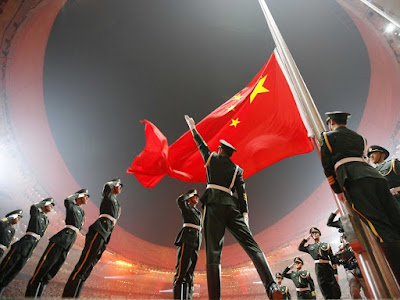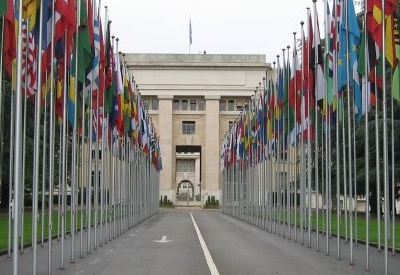Zeitgeist in uni polar China
from Sept. 2015/ edited Sept. 2018
Hegel founded and accepted the notion of a nation’s spirit in 15th century Germany. If we consider any sovereign nation-state as a spiritual entity, certain protection must be afforded those nation-states that effectively pursue positive actions in the international community. It should be safe to assume that Hegel would not have approved of the spirit of The Nazi Party despite the prevailing attitude of Weltanschauung in Germany at its peak, economic merits cast aside, see the Treaty of Versailles.3 Moreover, Hegel could have seen some of the destructive tendencies of the N.P., that would have run counter to his philosophy and teaching as a Lutheran -Protestant, and a Prussian nationalist. Yet, we see “Ethos” prominent in some nation-states through media, academia, and the national anthem. Witness the glory of Leni Riefenstahl's "Triumph of the Will" the vanguard in propaganda for that period.Triumph of the Will - Complete Who does this more effectively than the United States; particularly, at major sporting events to showcase its military prowess? No one, save for Autocracies such as. North Korea, China (2008 Olympics) and Russia.
China has been steadily influencing international markets as a fairly recent member of the WTO, and is now known as the “factory of the world” and the #2 global economic leader, surpassing Japan in 2010, while poised to unseat the U.S. as top economy by 2030, according to some experts. However, for all of the economic good-will and fury that developed nation-states have incurred through trade agreements with Beijing, the notion of human-rights receives short shrift from democracies that have an appetite for inexpensive Chinese goods. This leads to another argument about augmenting our economies by outsourcing our most valuable commodity-human resources. It seems odd that we would put our own national – good or “ethos” at risk to benefit the exploits of a nation-state, that has a dubious human-rights track record. Many folks can recall how the United States reacted to Cuba during the Cold War, see Helms- Burton 4, and is now only finding traction in Cuba with the reopening of the American embassy during the Obama Administration. According to Brooking's, the Trump Adminstration is ceding the rapprochement policy of Obama's Cuban detente ... "This included dire travel warnings, a dramatic 60 percent drawdown of U.S. embassy personnel in Havana, and the eviction of 17 staff from Cuba’s embassy in Washington last September in response to unexplained health incidents affecting U.S. diplomats."
As China continues its hard-line policy towards Tibetan culture and the TGIE (Tibetan Government in Exile,) the
continuation of self-immolations by Tibetans demonstrates a flawed outcome towards the Tibet policy by Beijing. Pouring Chinese capital into Tibet for infrastructure such as the Qinghai -Tibet railway, has seen major benefits for Tibet’s tourism industry, and Han – Chinese migrants that have steadily displaced Tibetan workers on their own territory.
A look at Chinese policy towards Buddhism, and followers of it, see Beijing’s policy’s within Tibet shifting the ethos that had been developed over centuries into a pro-Beijing , pro commercialization of Tibetan land,religion and values, towards a homeostatic balance between Beijing and the director of Chinese affairs in Tibet- Losang
Jamcan. Jamcan has continued to maintain Beijing’ hard-line approach towards Tibet, and, according to Reuter’s, was a teacher of Marxist ideology. Losang's preoccupation with serving the Central Government at the expense of his home-land, where he was born is nothing less than treasonous. Moreover, the "Disneynification" of the renowned and sacred "sky burial" sites at Larung Gar indicate the Central Government's pure intent in Tibet rests on monetary principles and not the "Dignification" of traditional Buddhist values on the Tibetan Plateau. http://tchrd.org/undercover-in-larung-gar-a-year-after-demolition-worlds-largest-tibetan-buddhist-institute-sliced-like-a-melon/
Therefore, we can feel ambivalence towards Tibetans, who occasionally “light up” and self-immolate, and to Hong
Kongers, who are subject to a deliberate, though muted approach to their freedom of universal suffrage, that took many years to instill under British colonialism (for all of its faults.)
Currently, Xi is preparing for a military parade on September 3 where he proclaimed "China will never seek hegemony or expansion." China’s growing strength in the region will be apparent to other nation-states to observe as China militarises The Spratley Archipelago and pursues its 'Belt & Road' initiative to expand trade routes through Europe. Russian President Vladimir Putin and South Korean President Park Geun Hye (now deposed), will attend; the latter to draw attention away from North Korea, the former, as a continuation of their working relationship in the economic zone- BRICS. It will seem obvious to China’s opponents in the region, such as, Japanese Prime Minister Shinzo Abe, that this edition of China presents an opponent unlike the 20th century model that was victimized by Japanese oppression. The endgame is nukes and most developed nation-states have some in their arsenal. For Xi, as he pursues more control of the Spratly Islands from its neighbours, Vietnam, Philippines,Malaysia and Brunei, he is commanding even the Coast Guard to disrupt shipments in the contested region.1.
Xi is no doubt promoting China’s “ethos” at home and abroad. He is careful to avoid a “tipping point” that would incite some of his best customers. One has to question, what is this tipping point, and is Xi aware of what it is. Most of us can postulate that the use of nukes or an attack on a smaller neighbour (Taiwan) may be enough to rail the international community against it. After all, it has more to lose than North Korea, who has taken liberties with its neighbour to the south. In the case of Japan and South Korea, the Americans maintain a strong presence in the region, until President Trump says otherwise, or Kim is caught enriching uranium, once again. For Tibetans, it will take an Act of God or Buddha to wrest any control back despite American power, or conflict with India or Chinese opponents that oppose their militarization of The Spratley's. As BRICS grows into a dominant economic zone, the possibility of India squeezing out the TGIE, remains a possibility. With approximately 8040 Tibetans living in Canada as of 2016, they are well represented in the Greater Toronto Area. As Hegel
said, “Nothing great in the world has ever been accomplished without passion.’2
Tibet can be in China if Beijing recognizes its distinct culture and autonomy: Dalai Lama
https://economictimes.indiatimes.com/news/international/world-news/tibet-can-be-in-china-if-beijing-recognizes-its-distinct-culture-and-autonomy-dalai-lama-dalai-lama/videoshow/63878361.cmsWorks Cited
1.FlorCruz, Michelle. “Philippine-China South China Sea Dispute Over Spratly
Islands: Human ‘Buffer’ Prevents Chinese31 August 2015.
<http://www.ibtimes.com/philippine-chinasouth-china-sea-dispute-over-spratlyislands- human-buffer-prevents-1990262>. Military Aggression.”International BusinessTimes. 30 June 2015.
2.Hegel,Georg Wilhelm Friedrich. Wikiquote. 30 August, 2015.
<https://en.wikiquote.org/wiki/Georg_Wilhelm_Friedrich_Hegel>. 2 September 2015.
3.Modern History Sourcebook: Treaty of Versailles, Jun 28, 1919.(c)Paul Halsall Aug
1997. <http://legacy.fordham.edu/halsall/mod/1919versailles.html>. 2 September 2015.
4.PBS Newshour. 16 July 2001. <http://www.pbs.org/newshour/updates/latin_america-july-dec01-helms-burton_07- 02/>. 2 September 2015.
 |
| Larung Gar-- monks & nuns evicted to make room for roads to accommodate tourists. |





